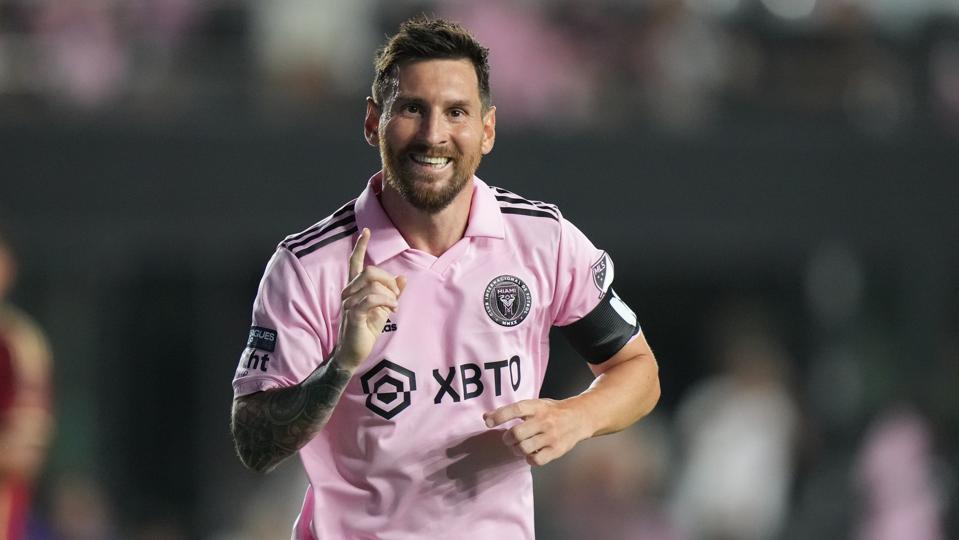Lionel Messi has lived up to every bit of the expectation in his first two appearances for Inter Miami, scoring three goals and contributing an assist in less than two hours of match time.
And whenever and however Miami’s run in the Leagues Cup ends, they will return to regular season play in August believing the addition of the the greatest living player on Earth can lift them from the basement of the standings into MLS Cup Playoff contention.
While Messi is now 36, the seven-time Ballon d’Or winner is less than a year removed from winning the Golden Ball award for being the best player at the 2022 FIFA World Cup. He may not be quite as durable or cover as much ground as in his 20s, but the technical abilities that have him in the discussion for the greatest of all time have not yet eroded.
As impressive as leading Miami into the postseason and making up a 12-point gap would be, there’s an even more audacious accomplishment looming out there if things break just right: Winning the 2023 MLS Golden Boot during a season in which he will play at most only 12 games.
Absurd as it may sound, if Messi continues to produce at anything close to the rate he has achieved in his first two games (in which he’s averaging about 2.5 goals per 90 minutes) he could conceivably have time to make up a 13-goal deficit against a field that is deeper than in other years but lacks an elite frontrunner.
It would take a combination of good health, a run as prolific as any point in his club career, and the lack of anyone else in the field going on a major heater of their own. It’s unlikely for sure. But not out of the realm of possibility.
Nashville’s Hany Mukhtar leads a crowded field with 13 goals, and nine players have at least 10 so far. But history says Mukhtar won’t repeat this season — there’s never been a back-to-back winner in league history. And of those who trail closely, only Giorgos Giakoumakis and Jesus Ferreira are something approaching true center forwards.
In the past decade — an era that marks the beginning of more rapid expansion and growth of team payrolls — 19 goals has been the bare minimum required to win the Golden Boot in a full season (Valentin Castellanos for New York City FC in 2021). Typically it requires more than 20. But no one is on a pace to score more than 20 as of now.
And Messi is not as far removed from the kind of attacking outburst that could see him enter the conversation in the short time he has remaining. In fact, just shy of his 34th birthday, Messi produced a stretch of 16 goals in 12 league games for FC Barcelona during the 2020-2021 campaign, his final season with Barca.
Rewinding further, he posted 19 goals in a stretch of 12 consecutive appearances during the 2014-2015 La Liga season, and as a considerably younger man, the 24-year-old Messi once scored 22 times in 12 league games during the 2011-2012 stretch run.
Sure, there are physiological limitations now that didn’t exist then. Messi won’t be playing every minute of every game for Miami, as he did during that sensational 2021 spring. He might not even appear at all in two of Miami’s away games at Atlanta United and at Charlotte FC, due to the synthetic surface at both venues.
But there are also obvious factors working in his favor at his new club.
Messi has been the greatest player on every team he’s played on. But at Barcelona and Paris St. Germain, there were other world class attackers who also needed the ball. At Miami, Josef Martinez and Leonardo Campana are solid MLS forwards (and at one time Martinez was far better than solid). But they won’t exactly bring the same demands for service as Ronaldinho, Neymar or Luis Suarez.
There’s also the obvious step down in class that has resulted in several previous MLS Golden Boot winners scoring far more often in an MLS campaign than they ever had in Europe.
For example, Carlos Vela’s La Liga career high was 16 goals, set in his age 24 season playing for Real Sociedad during the 2013-2014 campaign. As a 30-year-old in MLS, he posted the single greatest offensive campaign in league history in 2019, when he scored 34 goals and assisted another 16.
Sebastian Giovinco hit double digits only once in Italy’s Serie A for Juventus, but he reached that threshold in all four of his seasons with Toronto FC, including a Golden Boot-winning total of 22 goals in 2015.
And in maybe the most like-for-like comparision, Zlatan Ibrahimovic also came to MLS at age 36 and scored 52 goals in two seasons for the LA Galaxy, including a haul of 30 during the 2019 campaign. It was only the third 30-goal season of his pro career, all of those coming in his 30s.
The last thing working in Messi’s favor for an unlikely run at the Golden Boot is the lack of other high leverage games down the stretch. Yes, Miami faces a U.S. Open Cup semifinal and possibly final. But that’s relatively meager compared to the glut of UEFA Champions League and Copa Del Rey games Messi faced down the stretch in many of his seasons in Spain.
If anything, precedent suggests Messi’s run at the MLS Golden Boot this season is more likely than anyone is mentioning at the moment, and that his production level in MLS at 36 should be similar to that at 24 in Spain’s top flight. If it works out that way and includes a blistering run of form when league play resumes, he just might win the most incredible MLS Golden Boot title in league history.

